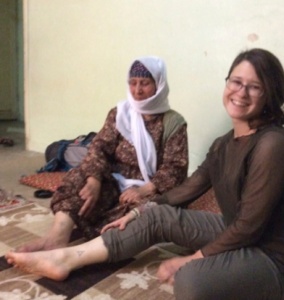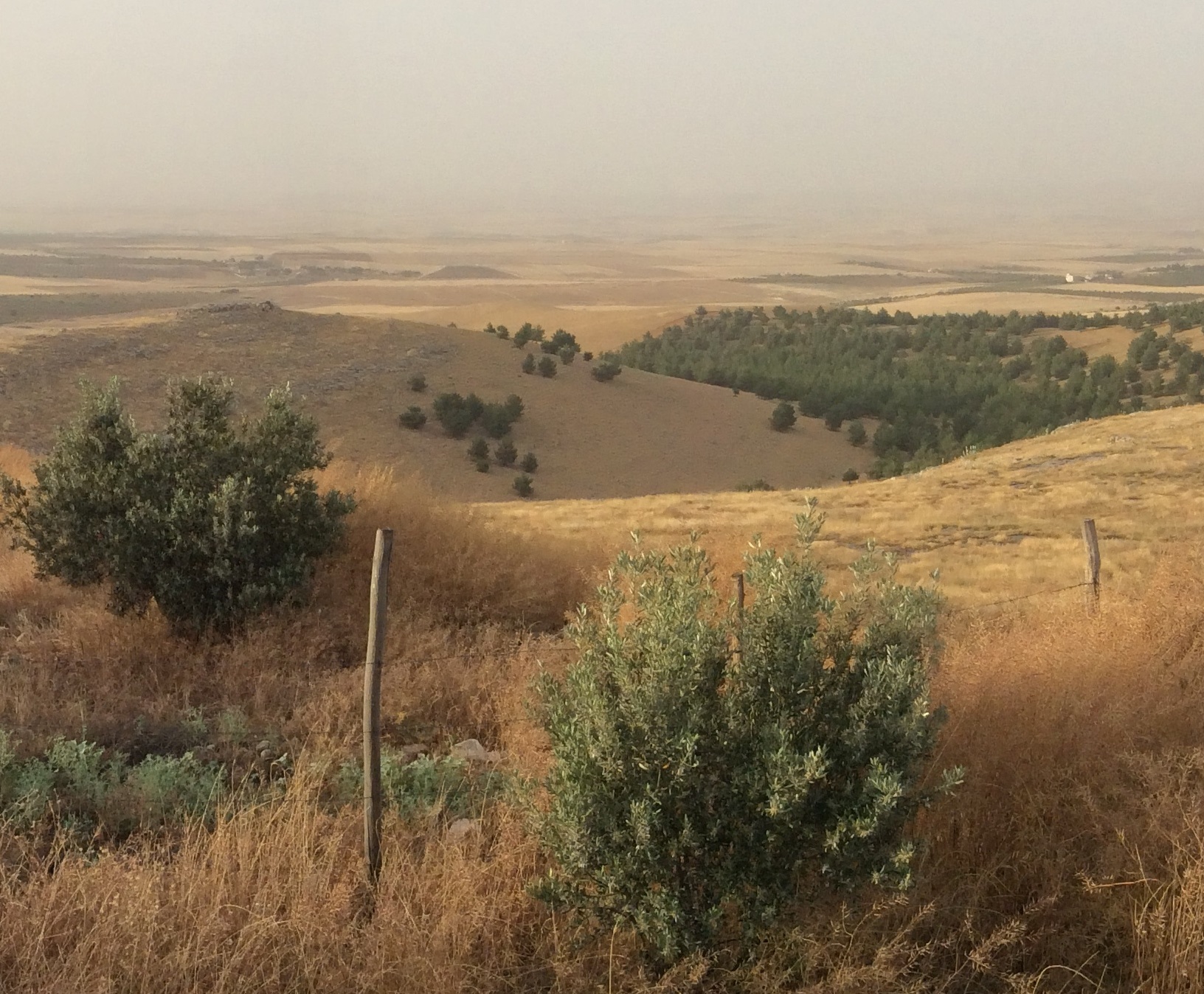By Eleanor Finley*
Will we resolutely face the consequences of a coherent, historicized revolutionary vision, or will we continue to slowly fade into a morass of ever-diminishing compromises? Kurds have found—indeed, have chosen—their place in the development of human freedom. What is ours?

Göbekli Tepe (Urfa, Kurdistan) site of one of the earliest known human structures. Kobane lies beyond the horizon. Source: ISE.
I recently had the opportunity to visit Turkey and North Kurdistan. In that short time, Istanbul celebrated the third anniversary of the struggle to protect Gezi Park, the People’s Democratic Party (HDP) won unprecedented political representation in the Turkish parliament, and the cantons of Cizire and Kobane were joined. Throughout these dramatic events, I was often sitting cross-legged on living room floors, drinking tea and listening to the stories of journalists, activists, and families who had participated in the Rojava Revolution. Such conversations were made possible through many comrades, most of all through Jihad Hemmi, who acted as a guide, translator, and intellectual companion. Through my travels, I was given a glimpse of the relation between the Kurdish freedom movement and the philosophy of social ecology. By the same token, I gained a much clearer sense of the extraordinary scope and meaning of this particular revolutionary struggle.
Reviving Politics
Social ecology is a coherent Leftist vision that underscores the potential for human beings to play a mutualistic and creative role in natural evolution. We can fulfill this potential, social ecology argues, by uprooting the irrational, hierarchical, and ecologically-destructive society we currently live under, and by replacing it with a socially-enlightened and ecological society. An essential feature of such a society would be the Aristotelian notion of politics, that is, the direct management of towns, cities, and villages by the people who live there. In other words, social ecology maintains that we can supplant capitalism and the state with a global federation of directly-democratic municipalities.
Left-libertarian thinker Murray Bookchin developed the concept and field of social ecology from the 1960s until his death in 2006. Today, many other education projects, publishing ventures, political organizations, and writers also constitute this intellectual movement. Social ecology groups exist in many countries- including Turkey, Norway, Spain, Greece, Columbia, the United States and others. Although marginal on the Left as well as the mainstream, social ecology has had 40 years of steady influence on social and political movements throughout the world.
PKK leader Abdullah Ocalan started reading Bookchin at the beginning of his prison exile in the early 2000’s, bringing Bookchin’s works to his lawyers as recommended reading for the rest of the PKK. In 2004, Ocalan recognized himself in a letter to Bookchin as his “student”, and was in the process of establishing his own theories modeled on Bookchin’s ideas. In 2006, the PKK began organizing Democratic Autonomy, an administrative system of civic councils to statelessly govern North Kurdistan. Democratic Autonomy would become an important antecedent for the cantons in Rojava, as well as for the confederal projects currently being set up within the Turkish state by the HDP (People’s Democratic Party).
Democratic Autonomy is one of the first revolutionary Left project to exercise power under an explicitly confederalist agenda. Although it did not practice direct democracy, it did mark the 21st century’s first serious attempt to approach the municipality—not the nation or the state—as the authentic unit of governance. Unlike traditional Marxism, which reduced politics to economics and thus failed to offer democratic solutions, this approach brings economic decisions under the umbrella of communal decision-making. And unlike traditional anarchism, which avoided the question of institutional power altogether, this approach seeks to popularize power and render it transparent. Democratic Autonomy, the Rojava cantons, and other projects under democratic confederalism are steps toward creating (however imperfectly) a new realm of human activity characterized by free deliberation, debate, and the exercise of reason.
Freedom and Organic Society
“The PKK never regarded the Kurdish question as a mere problem of ethnicity or nationhood. Rather, we believed, it was the project of liberating society and democratizing it.”
– Abdullah Ocalan, 2011.
Intellectual commentators of the Kurdish revolutionary movement often focus on the juncture of principles and practice, looking no farther back in history than the establishment of the PKK in the 1970’s. But in order to understand how (or rather why) these principles came to emerge, one must use a deeply historical and dialectical lens. Social ecology offers one crucial piece of that puzzle. Through Ocalan’s interpretations, it has offered Kurds a radical new framework for asserting their role in the history of human liberation.
In The Ecology of Freedom, Bookchin accounts for the historical development of the concept of freedom. He identifies the beginning of this development in the earliest human settlements of Mesopotamia, what is now modern day Kurdistan. Nearly 12,000 years ago, human beings initiated a decisive step in social development, undertaking the project of living together with more than they could carry on their backs. This project presented vast new challenges for organizing and making sense of the world. Thus Mesopotamia is where we find the earliest instances of written language, mathematics, architecture, and agriculture. It is also, Bookchin recognized, where we find the beginnings of the struggle between ideologies of freedom and domination.
Bookchin points to the cuneiform word amargi (“return to the mother”), which first appears nearly 5,000 years ago in juxtaposition to the newly oppressive conditions under the Sumerian state. Organic society, he argues, had no previous word for the concept of ‘freedom’, just as fish might have no word for ‘water’. This conflict between freedom and unfreedom has stayed with society to the present day. Indeed, the revolutionary challenge we face today is that of pushing the development of freedom forward, making freedom, rather than hierarchy, the dominant social principle.
Just a few short days within a Kurdish household reveal that the organic society upon which the earliest states imposed themselves never fully vanished. From oral traditions of epic song to meaningful practices of naming children (I spent time with a little girl named Amargi, for instance), Kurds have retained ancient forms of egalitarian and organic social life since the Neolithic. Like many organic or so-called indigenous peoples, traditional Kurdish kinship networks are vast and intricate. Once, while explaining the role of tribal groups in the Kobane defense, Jihad turned to me and asked, “How many cousins do you have?” “About 20,” I replied, “I have a big Catholic family on my father’s side,” to which he responded, “Counting both sides, I have over 200.”

An Ocalanist and the author share tattoos. Tattoos are prohibited under Islam, but are a retained aspect of Zoroastrianism in Kurdish culture. Source: ISE.
Many of the Ocalanist revolutionaries I spoke to described their struggle as one of organic society against authoritarian society. They articulated a clear sense that not only capitalism and statist forces produced ISIS, but also the mentality of hierarchical society itself. However, it was also emphasized that the purpose of democratic modernity is not simply to revive organic society. Rather, it is to revive the social and ethical aspects of organic society and weave them with the ethical principles gained by Western enlightenment. At the same time, it advocates the use of reason to work out the unethical aspects of traditional Kurdish society (tribal rivalries, for example), while also refusing the cold scientism and positivism of the west. Such a synthesis moves us into a new stage in the development of freedom, one which Ocalan calls “democratic civilization” and which Bookchin referred to simply as a free society.
The Power of a Coherent Narrative
By focusing on hierarchy instead of class, Bookchin became the first Leftist thinker to offer a coherent, meaningful framework for the liberation struggles in the Middle East. His narrative implies that a revolutionary movement in Kurdistan is a struggle at the material origin of institutional hierarchy itself. Although such a localized struggle cannot automatically release hierarchy’s tight grip over rest of the world, it does powerfully illustrate the full scope of the revolutionary task at hand. In this way, the Kurdish freedom movement is not only influenced by social ecology, it also enriches that perspective and articulates it further. The human beings who live at the material origins of institutional hierarchy, and who have maintained organic ways of life there for millennia, are now answering the call to establish the positive conditions of a free society.
Many westerners are baffled by the determination of PYD and YPJ fighters, their ability to simultaneously withstand multiple attacks of genocidal violence and maintain a commitment to the praxis of anti-authoritarianism. In Kurdistan I found myself humbled by the seriousness with which revolutionaries went about their project. Yet from a social ecological perspective I was also able to grasp that the Kurdish movement is infused with a deep sense of purpose, a knowledge that they have a catalytic role to play in world history. I was reminded of one of the passages in Bookchin’s essay, The Communalist Project:
“[Communalists] do not delude themselves that the state will view with equanimity their attempts to replace professionalized power with popular power…That the new popular-assemblyist municipal confederations will embody a dual power against the state that becomes a source of growing political tension is obvious. Either a Communalist movement will be radicalized by this tension and will resolutely face all its consequences, or it will surely sink into a morass of compromises that absorb it back into the social order it once sought to change.”
Clearly Kurds have selected the former path. What remains to be answered is how will we respond? Will we resolutely face the consequences of a coherent, historicized revolutionary vision, or will we continue to slowly fade into a morass of ever-diminishing compromises? Kurds have found—indeed, have chosen—their place in the development of human freedom. What is ours?
* A previous version of this article first appeared in the blog of the Institute for Social Ecology.
** Eleanor Finley has been a student at the ISE since 2011. She has a background in feminist activism and was a participant in the Occupy Wall Street Movement. Eleanor is a graduate student in anthropology at the University of Massachusetts, Amherst, where her research focuses on social movements, environment, and energy in Europe. She is currently conducting action-research within the Spanish anti-fracking movement, and interns with Environmental Justice Organizations, Liabilities and Trade (EJOLT) at the Autonomous University of Barcelona. Click here for more info and for links to Eleanor’s writings.






2 Comments